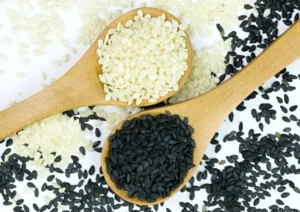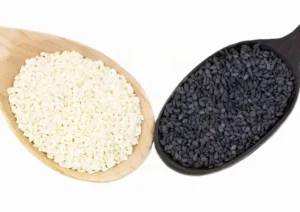Unlocking the Benefits of White and Black Sesame Seeds:
A Comprehensive Guide
Sesame seeds are a tiny superfood packed with nutrients. You might see them sprinkled on bread, salads, or sushi.
Their popularity keeps growing as more people look for natural ways to boost health.
Whether white or black, these seeds offer unique benefits that can support your wellness journey.
Let’s explore what makes each type special and how they can help your body.
The Nutritional Profile of White and Black Sesame Seeds
Overview of Sesame Seeds Nutrition
Sesame seeds are rich in healthy fats, protein, and fiber. They contain about 5 grams of protein and 9 grams of fat per ounce.
The good fats are mainly unsaturated, which help protect your heart. Plus,
they have a decent amount of fiber, aiding digestion and keeping you full longer.
When it comes to micronutrients, sesame seeds shine. They are among the best plant sources of calcium, magnesium, iron, and zinc.
These minerals are vital to bone strength, energy production, and immune health.
Sesame seeds also contain plant compounds called antioxidants, such as sesamin and sesamol, which fight inflammation and protect your cells.
Differences Between White and Black Sesame Seeds
The main difference lies in their composition. Black sesame seeds tend to have higher amounts of antioxidants and phytochemicals,
thanks to their dark color. They contain more phenolic compounds, which boost their health-boosting power.
White sesame seeds are milder and more neutral in flavor, making them a popular choice in baking and cooking.
They also pack a lot of calcium, supporting strong bones. Overall, black seeds usually offer a richer profile of antioxidants,
while white seeds are known for their high calcium content.
Health Benefits of Sesame Seeds
Heart Health and Cholesterol Management
Eating sesame seeds regularly can help lower bad cholesterol levels.
Their lignans and phytosterols work to block cholesterol from sticking to artery walls.
Studies show that consuming sesame seeds may reduce LDL cholesterol and boost good HDL levels.
A handful of seeds daily can support your heart naturally.
Bone Health and Mineral Content
Both types of sesame seeds are excellent sources of calcium and magnesium.
These minerals are essential for keeping bones strong and preventing osteoporosis.
Incorporating sesame seeds into your diet may improve bone density over time.
They’re especially helpful for those who avoid dairy but want to keep bones healthy.
Antioxidant and Anti-inflammatory Properties
Sesame seeds contain powerful antioxidants like sesamin and sesamol.
These compounds help reduce oxidative stress and inflammation in the body.
This can lower your risk of chronic illnesses such as heart disease and arthritis.
Regular intake may give your body extra defense against daily stressors.
Digestive Health and Weight Management
Thanks to their fiber content, sesame seeds support good digestion.
They add bulk to your stool, helping prevent constipation. Since they also promote satiety, these seeds can curb overeating.
Sprinkle them on salads or yogurt to boost both nutrition and fullness.
Unique Benefits of White and Black Sesame Seeds
White sesame seeds are mild and nutty, making them a favorite for baking. They’re often used in cookies, bread, and tahini.
In many Asian cuisines, white sesame seeds symbolize tradition and subtle flavor.
Black Sesame Seeds: Richer Flavor and Higher Antioxidant Content
Black sesame seeds have a deeper, nuttier taste that pairs well with savory dishes and desserts.
They contain more antioxidants, which could enhance their health benefits.
Some believe black seeds help improve skin, promote hair growth, and boost energy.
Their unique color and flavor make them perfect for gourmet or traditional recipes.
Practical Tips for Incorporating Sesame Seeds into Your Diet
Adding sesame seeds is easy and tasty. Try sprinkling a tablespoon on salads, oatmeal,
or stir-fries. You can also bake them into bread or blend into smoothies.
Toasting seeds briefly enhances flavor and helps your body absorb nutrients better.
Remember, moderation is important—about one to two tablespoons a day should do.
Tips for Better Absorption
- Toast seeds lightly for richer flavor.
- Pair with vitamin C-rich foods (like lemon or berries) to boost mineral absorption.
- Keep stored in a cool, airtight container to maintain freshness.
Precautions
People with sesame allergies should avoid these seeds. Also, because they contain oxalates,
consuming large quantities may affect kidney health in sensitive individuals.
Keep seeds away from moisture and heat to prevent rancidity, which can degrade nutrients.
Potential Risks and Considerations
While sesame seeds are generally safe, some may experience allergic reactions.
These can cause symptoms from mild itching to more serious issues. If you’re allergic or sensitive, steer clear or consult your doctor.
Oxalates are naturally present and could pose a concern for those with kidney stones.
It’s wise to enjoy sesame seeds as part of a balanced diet rather than in excess.
Conclusion
Both white and black sesame seeds are packed with health benefits.
They support heart health, strengthen bones, deliver powerful antioxidants, and boost digestion.
Their unique flavors and nutrient profiles make them adaptable in many recipes.
Including sesame seeds regularly can help enhance your overall wellness.
Call to Action
Start small—add a tablespoon of sesame seeds to your meals each day.
Try different recipes that use both white and black seeds. Remember, a balanced diet is key, so enjoy sesame seeds as part of a varied diet.
Always check with your healthcare provider if you’re unsure about introducing new superfoods into your routine.
HOSTINGER HOSTING PACKEGE DISCOUNT CODE




Leon89, huh? Sounds like a cool dude *and* a betting site. Worth a look just based on the name, right? Let’s go! Find out for yourself at leon89.
Alright, alright, 567slotsbetbet… that’s a mouthful! Hopefully the winnings are easier to grab than the name is to say. Checking it out now! Wanna try some slots? 567slotsbetbet is waiting.
97winbet, eh? Never heard of it before, but the website looks pretty slick. Gonna give it a whirl and see if luck is on my side! Fingers crossed! Check it out for yourself 97winbet.
Yo! I’ve been messing around with 98bet lately. The odds seem pretty competitive, and the platform is smooth. Deposits and withdrawals were easy too, which is a huge plus in my book.
500jllogin, the login process is fast. Got right in and started playing in no time. Give it a shot at 500jllogin.